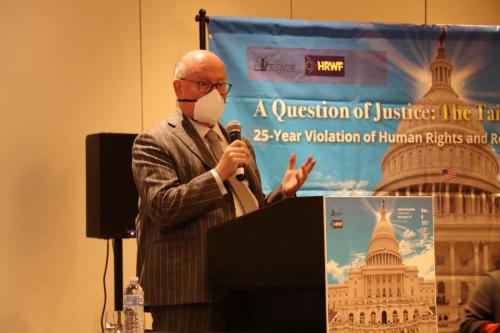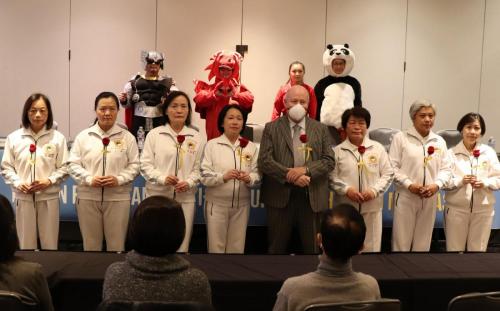Human Rights Protection and Anti-Corruption
MNN TV station in New York broadcast a program featuring an international forum "Human Rights and Anti-Corruption: The Tai Ji Men Case,” in honor of Human Rights Day and Anti-Corruption Day.

Prof. Massimo Introvigne, a world-renowned scholar of new religions as well as the founder and managing director of the Italian Center for Studies on New Religions, flew from Italy to Washington, D.C. to voice his support for Tai Ji Men.
On January 12, 2022, MNN TV station in Manhattan, New York, broadcast a program featuring an international forum entitled "Human Rights and Anti-Corruption: The Tai Ji Men Case.”
The event, which commemorated International Human Rights Day (December 10) and International Anti-Corruption Day (December 9), was organized by the Center for Studies on New Religions and Human Rights Without Frontiers on December 6, 2021, in Washington, D.C., the world’s political capital. The forum, which participants could attend in person or virtually, focused on the Tai Ji Men case, which has lasted for a quarter of a century in Taiwan.

Tai Ji Men members sang a song titled "Love" together, each holding a stem of rose with a yellow ribbon. The brilliant red roses represent love, while the yellow ribbons express their hope for Taiwan's restoration to freedom, democracy, and conscience.
Because the case involves gross human rights violations and religious persecution and has significant global implications, Prof. Massimo Introvigne, a world-renowned scholar of new religions as well as the founder and managing director of the Italian Center for Studies on New Religions, flew to Washington, D.C., using his decades of professional experience in protecting human rights and religious freedom to speak out for justice and support Tai Ji Men, even though COVID testing was required for travelers from Europe to the United States.
The Tai Ji Men case began in 1996 in Taiwan when a prosecutor named Hou Kuan-jen falsely accused Tai Ji Men of fraud, tax evasion, and raising goblins. In 2007, Taiwan’s Supreme Court found Tai Ji Men not guilty of tax evasion or any other charges. In a democracy adhering to the rule of law, the case should have ended there; instead, Taiwan’s National Taxation Bureau disregarded the Supreme Court’s decision and continued to impose unjustified taxes on Tai Ji Men. In August 2020, based on the unlawful tax bill, the taxation bureau in cooperation with the Administrative Enforcement Agency illegally auctioned and forcibly confiscated Tai Ji Men’s sacred land intended for a self-cultivation center for Tai Ji Men members.
Prof. Massimo Introvigne stated, “In the Tai Ji Men case, bureaucrats forgot, or willingly ignored, that they are ‘civil servants’ and should work at the service of the deeper aims of the state, human rights and the well-being of citizens. Instead, they believed they were called to protect bureaucracy for bureaucracy’s sake, not to mention they tried to enrich themselves through the bonuses.” “The Tai Ji Men case of ‘corruption’ went beyond taxes and money. It attacked the very soul of a nation, corrupting it deeply. Only a solution to the Tai Ji Men case may stop this slow erosion and poisoning of the integrity of Taiwan’s soul, a kind of process that, as history shows, normally leads to the ruin of a nation,” he added.
Five additional scholars and human rights experts also shared their insights on the case. Willy Fautré, the director of Human Rights without Frontiers, addressed several issues, including the definition of corruption, the negative impact of corruption on human rights, how to fight against corruption, and corruption related to the Tai Ji Men case. He noted, “It is obvious that in Taiwan there are abuses by the administrative power for private gain. What is at stake here is the system of bonuses which viciously leads to the over-collection of taxes and even the fabrication of tax evasion taxes. This is an abuse of power for private financial gain.”
Tai Ji Men members from all over the world also expressed their thoughts on the case. Cici Han, a Harvard graduate and a California architect in training, stated that Tai Ji Men Qigong has significantly relieved her chronic allergies. She noted that she learned from her Shifu (master), Dr. Hong, Tao-Tze, that the most important way to deal with people is to follow one's conscience and honestly face and correct one's mistakes. She said that the Tai Ji Men case was caused by a small number of unscrupulous Taiwanese government officials who disobeyed their conscience and refused to admit their mistakes. She sincerely hoped that the rogue bureaucrats would acknowledge and correct their mistakes, return Tai Ji Men’s sacred land, rectify the Tai Ji Men case, and take responsibility for the suffering of the leader and members of Tai Ji Men over the past 25 years.
Noemi M. Nakano, who immigrated from Mexico to the U.S. as a child and now lives in Los Angeles, said that after joining Tai Ji Men, her physical and mental health has improved dramatically, and she is now radiant, smiling, and peaceful, bringing happiness to those around her. Thanks to the newfound positive energy, she was able to travel to her home country of Mexico to promote International Day of Conscience in March 2020. She said, “My journey in Tai Ji Men has given me so much that it is hard to describe such priceless valuable treasure.” She is perplexed as to why Tai Ji Men, which is such a wonderful organization, has been persecuted, and she sincerely hopes that the Taiwanese government will return justice to Tai Ji Men.
Jessica Kuo from Canada explained that what Tai Ji Men’s shifu (master) wants them to learn is to be true to themselves, correct themselves, realize the true meaning and value of life, and experience the joy of helping others and themselves. She lamented that this unjust case has deprived countless families of the opportunity to improve their lives through Tai Ji Men Qigong. She admires Dr. Hong for never succumbing to the forces of evil and for leading his dizi (disciples) on the path of righteousness and truth for so many years!
Jeff Chen, a software engineer from New York, joined Tai Ji Men at the age of seven. He used to be shy, and his classmates started to mock and reject him following prosecutor Hou Kuan-jen’s unlawful prosecution and smear campaign against Tai Ji Men when he was 11. Now a grown-up, he spoke out about the persecution and injustices against the organization, encouraging people to do what is right and say no to what is wrong and illegal. He concluded his speech by saying, "I hereby urge the National Taxation Bureau and the Taiwanese government to correct their mistakes, revoke Tai Ji Men's 1992 tax bill, return Tai Ji Men's sacred land, and begin following all the good practices and philosophies to better serve the people of Taiwan."
During the event, a group of Tai Ji Men members sang a song titled "Love" together, each holding a stem of rose with a yellow ribbon. The bright red roses represent love while the yellow ribbons express their hope for Taiwan's restoration to freedom, democracy, and conscience, allowing everyone to live in peace and happiness.
Source: Bitter Winter
- 618 reads
Human Rights
Fostering a More Humane World: The 28th Eurasian Economic Summi

Conscience, Hope, and Action: Keys to Global Peace and Sustainability

Ringing FOWPAL’s Peace Bell for the World:Nobel Peace Prize Laureates’ Visions and Actions

Protecting the World’s Cultural Diversity for a Sustainable Future

Puppet Show I International Friendship Day 2020

